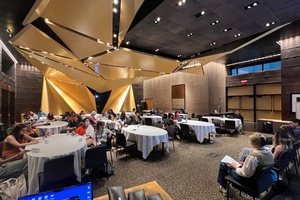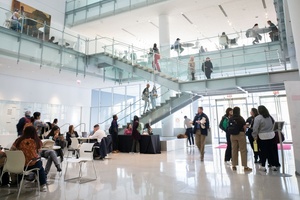Features:
How Would You Like Leadership in Journalism to be Different?
Answer: more diverse, interdisciplinary, and intentional

The main hall of SRCCON 2016 in Portland. (Photo: Erik Westra for OpenNews)
As part of planning our upcoming conference, SRCCON:LEAD, we’ve heard from over 100 journalists about how they would like leadership in our industry to change. We asked this question of every prospective attendee, no matter their role, because we know that the answers to journalism’s challenges already exist within our organizations. It’s just that the best solutions don’t usually come from the top of the org chart.
“How would you like leadership in journalism to be different?”
What we heard— from a variety of people at a range of organizations—was remarkably consistent: We need leadership that is more diverse, more interdisciplinary, more intentional in its development, and more open in its communication.
One prospective attendee put it simply: “I wish newsroom leaders cared more about what their communities thought about them than what other journalists think of them.”
More things we’re thinking about, with the people who will be in the room at SRCCON:LEAD:
What does it mean to serve, engage, reflect, and inform communities? Nearly 2/3 of responses cited diversity as an area where leadership needs to change, both in terms of representation and in how to shift the ways that newsroom culture functions. “I’d like trainings around whiteness to be normalized in U.S. newsrooms and provided at major journalism conferences,” said Carla Murphy, who also recently wrote about “Why We Need Working-Class Media.”
The SRCCON crowd includes folks from a range of data, tech, and editorial roles in and near newsrooms. What could it look like to value that experience as a route to newsroom leadership? “Too often we are replicating the structures and habits of the legacy newsrooms where newsroom leadership, including myself, began our careers. There have to be better ways for journalists with technology skills to be integrated into the newsroom, for projects to originate and to ensure our skills are developed so our reporting and journalism skills improve at the same rate as our coding skills,” said Tom Meagher.
To value interdisciplinary perspectives and experience, we must understand them: “I want top management to prioritize empathic and transparent communication with their staff, and I want them to value and understand journalism that isn’t just 5,000 words on a printed page,” said Hannah Birch.
Sabrina Hersi Issa, who attended SRCCON:WORK, urged me to make this event a place for blue-sky thinking about what journalism can even be. At SRCCON:LEAD, we’re imagining a broader future, not just a slightly different way of doing things.
Attendees envision:
“In my perfect future, diverse newsrooms are the expectation, rather than the exception, and thus leadership is diverse as well. There would be clear pathways to leadership for people from backgrounds underrepresented in the industry. I envision story pitching and storytelling that incorporate more voices throughout the process,” said Sophie Ho.
We get there with “a world in which managers serve more as facilitators than as top-down decision-makers. I would also love to see a world in which leadership is recognized and compensated at all levels, not just in management positions,” said Audrey Carlsen.
At its core, all of these questions about leadership come back to people. As Candice Fortman of Outlier Media put it, we need “people-first leadership. Too often the money, content, products, and trends get more time and attention than the people who make the work and those who use it to power their lives. What happens when we put more time into the people? When we give them better resources, better management, and more power? Would we get better content that serves more diverse communities?”
On November 19–20, we’re exploring exactly those questions at SRCCON:LEAD.
—
SRCCON:LEAD is a hands-on conference to figure out ways we can reshape how journalism leadership operates. Learn more.
Credits
-
 Erika Owens
Erika Owens
Co-Executive Director of OpenNews.



